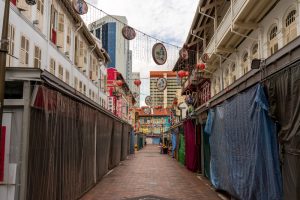Singapore yesterday announced plans to launch its first quarantine-free travel program for vaccinated visitors, as the city-state eyes the full reopening of its borders, the government said Thursday.
From September 8, visitors from Germany and Brunei can apply for a Vaccinated Travel Pass to enter Singapore, regardless of their reason for traveling. In place of quarantine, they will be required to take several COVID-19 tests and undertake a short period of self-isolation. They will also be required to hold insurance that covers COVID-19 medical treatment. At the same time, vaccinated Singaporeans can visit Germany without serving quarantine, although Brunei currently remains closed to leisure travel.
“As the global COVID-19 situation evolves, we will continue to adjust our border measures with the appropriate safeguards to ensure public health and safety,” the Civil Aviation Authority of Singapore said yesterday, according to the Associated Press.
Under the scheme, German and Bruneian travelers must have stayed in their country of departure, or in Singapore before that, for at least 21 consecutive days before departing for Singapore. Singapore also announced a separate easing of restrictions for vaccinated visitors from Hong Kong and Macao. Visitors from the two Chinese territories will Hong Kong and Macau will be able to enter the city-state with just one on-arrival COVID-19 swab test.
In a separate announcement yesterday, Singapore also reduced restrictions on visitors from Hong Kong and Macao, who can apply to enter Singapore from August 26, provided that they have spent three consecutive weeks in those cities before departure. Quarantine is not required if they undertake a COVID-19 test on arrival and remain in isolation until a negative result is confirmed.
At the same time, the long-awaited travel bubble between Singapore and Hong Kong – which has already been postponed twice, has seemingly burst for good, due to a mismatch in COVID-19 strategies between the two regions.
On Friday, Hong Kong will tighten its border control measures, despite relatively low instances of COVID-19, in line with the city’s controversial “zero COVID-19” strategy. This will require vaccinated travelers from Singapore and other places deemed to be “medium-risk” to serve a 14-day quarantine, instead of the previous seven days.
Singapore, on the other hand, is beginning to reconcile itself to a world in which COVID-19 is endemic. Earlier this month, the country’s multi-ministry pandemic taskforce announced that with more than 70 percent of the population of 5.5 million now fully vaccinated against the virus – by far the highest vaccination rate in Southeast Asia – it would begin the transition to becoming a “COVID-19 resilient nation.”
This will involve loosening restrictions and opening its borders “in a cautious and calibrated way,” with a further relaxation of curbs to come once 80 percent of the population is fully vaccinated, something that is likely early next month.
Singaporean Transport Minister S. Iswaran said yesterday that both Singapore and Hong Kong ” are focused on keeping our populations safe and minimizing the risk of imported cases. But our strategies differ, with Singapore now taking steps to becoming a COVID-19-resilient nation.” As such, the two nations have “concluded that we will not be able to launch or sustain the air travel bubble in its present form.”

































